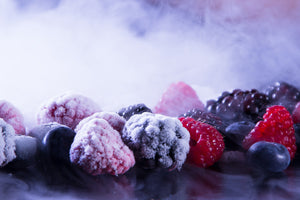
We thought this was an interesting study done by researchers at University of Georgia in conjunction with the Frozen Food Foundation, a non-profit of frozen food makers and sellers. Although there seems to be a noticeable conflict of interest, we think there is one message that is valid. Fresh vegetables almost always taste better, and offer optimal vitamins and minerals at its peak of ripeness and freshness. However, due to our modern infrequent grocery shopping to eating cycles, some frozen vegetables may actually be a better option for vitamin and mineral content, rather than eating old, going-stale vegetables that have been sitting in the refrigerator for many days (or weeks) on end.
According to food retail studies, Americans typically go grocery shopping 1.6 times per week. I would say for busy professionals or working parents, this may be more like 1 time per week. This stat essentially means we buy for the week, not for the day. The study examines nutritional value of a variety of vegetables—broccoli, cauliflower, corn, green beans, green peas, spinach, blueberries, and strawberries—compared in three different ways: 1) fresh, 2) frozen, and 3) produce bought fresh but stored in the refrigerator for five days (“fridge-stored”). Think of times when we buy broccoli, cauliflower, or corn, it is pretty safe to say that most of us have kept that in the fridge for awhile.
Generally, the study found few nutritional differences between all three storage methods, but there were some exceptions, and those exceptions tended to favor frozen and fresh over the fridge-stored produce. Green beans, for example, showed a 40 percent lower vitamin C content when fridge-stored, compared to frozen. Frozen corn showed much higher levels of beta-carotene than either fresh or fridge-stored. Frozen peas showed 19 percent more folate than fridge-stored. However, on the other hand, frozen broccoli showed less folate content than fresh.
Overall, opt for fresh if you can consume quickly. Knowing that frozen peas and frozen corn actually retain more select nutrients confirms that this is a great vegetable option, and for us, serves as emergency veggie options when all else fails. Or, reach for our baobab superfruit powder, because it has neither fresh or frozen issues. Baobab naturally dehydrates in the shell! And, we leave it raw in the bag for our organic baobab superfruit powder, and raw in our baobab superfruit chews®.
References: Frozen Food Study
